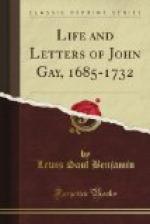“If you will write to me you will make me cheerful and happy, without which I am told the waters will have no good effect. Pray have some regard to my health, for my life is in your service.”
* * * * *
There is no mention of Gay during the first nine months of the year 1724, after which it has been possible to gather scant information. Apparently, encouraged by the kindly interest displayed by the Princess of Wales, Gay, still obsessed with his desire for a place, went frequently to Court. “I hear nothing of our friend Gay, but I find the Court keep him at hard meat. I advised him to come over here with a Lord-Lieutenant,"[3] Swift wrote to Pope, September 29th, 1725. To this Pope replied on October 15th: “Our friend Gay is used as the friends of Tories are by Whigs, and generally by Tories too. Because he had humour he was supposed to have dealt with Dr. Swift; in like manner as when anyone had learning formerly, he was thought to have dealt with the devil. He puts his whole trust at Court in that lady whom I described to you."[4] “That lady,” presumably was Mrs. Howard. But Gay, unable to secure the interest of the politicians, and getting weary of waiting on his friends, suddenly bethought himself of making a direct appeal to royalty. “Gay is writing tales for Prince William,"[5] Pope wrote to Swift on December 10th. “Mr. Philips[6] will take this very ill for two reasons, one that he thinks all childish things belong to him, and the other because he will take it ill to be taught that one may write things to a child without being childish.” Than which last few prettier compliments have been paid to Gay.
Though they had long been in correspondence, Swift and Gay had not yet met. Swift, of course, had often in his mind a visit to London—he admitted the temptation, but resisted it. “I was three years reconciling myself to the scene, and the business to which fortune had condemned me, and stupidity was what I had recourse to,"[7] he had written to Gay from Dublin, January 8th, 1723. “Besides, what a figure should I make in London, while my friends are in poverty, exile, distress, or imprisonment, and my enemies with rods of iron?” At last, however, in March, 1726, he did come to London, and he was




